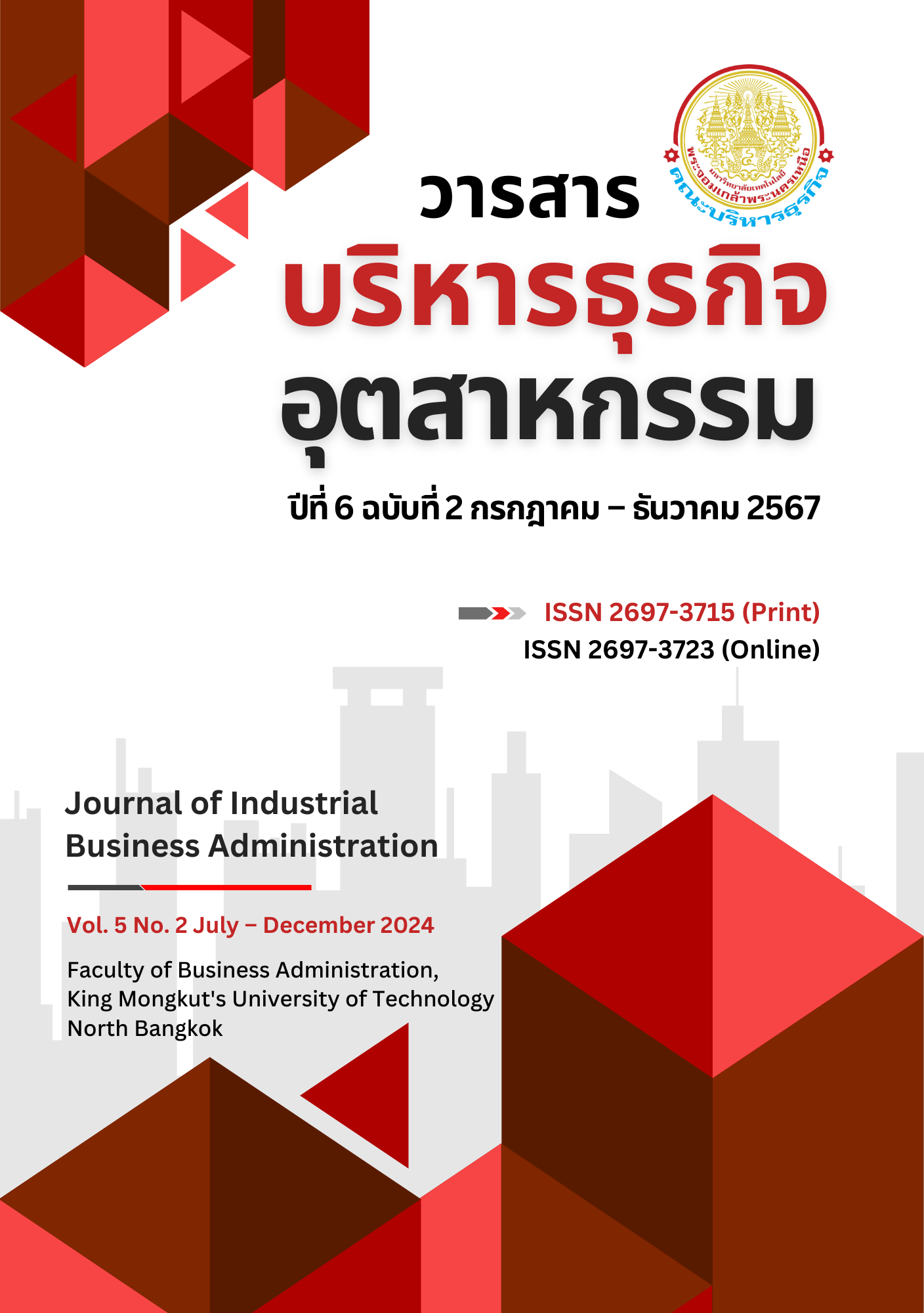Work Engagement as Mediating Factor Linking Transformational Leadership to Good Membership Behavior among Construction Company Employees in Nakhon Pathom Province
Keywords:
Transformational leadership, Work engagement, Good membership behaviorAbstract
The objectives of this research are 1) to study the levels of transformational leadership, work engagement, and behavior of being a good member of construction company employees in Nakhon Pathom province and 2) to study work engagement as a mediator between transformative leadership and good membership behavior among construction company employees. This research is quantitative research by surveying a sample group of 200 employees of construction companies in Nakhon Pathom province under the concept of Hair et al., (2006) via simple random sampling. The research tool was a questionnaire with a reliability of 0.892. The statistical methods used 1) descriptive statistics including frequency, percentage, mean, and standard deviation, and 2) inferential statistics by structural equation analysis (SEM) via the Smart PLS 3.0 program. It was found that 1) transformational leadership, work engagement, and good membership behavior among employees of construction companies have overall averages at a high level with values of 3.97, 3.83, and 3.91, respectively, and standard deviations of 0.792, 0.714, and 0.754, respectively, and 2) transformational leadership and work engagement have a direct positive influence on good membership behavior with values of 0.092 and 0.762, respectively. In addition, transformational leadership also indirectly influences work engagement as a transmission factor with a value of 0.531.
References
Best, J. W. (1981). Research in Education (4th ed.). Englewood Cliffs, New Jersey: Prentice-Hall.
Bortnowska, H., & Seiler, B. (2023). Organizational citizenship Behaviors and Psychological working conditions examined through the prism of for-profit, public and nonprofit organizations. Scientific Papers of Silesian University of Technology – Organization & Management Series, 2023(184).
Budur, T. (2020). Effectiveness of transformational leadership among different cultures. International Journal of Social Sciences & Educational Studies, 7(3), 119-129.
Hair, E., Halle, T., Terry-Humen, E., Lavelle, B., & Calkins, J. (2006). Children's school readiness in the ECLS-K: Predictions to academic, health, and social outcomes in first grade. Early Childhood Research Quarterly, 21(4), 431-454.
Khalilzadeh, M., & Ghesmati, H. (2024). Organizational citizenship behavior based on trust in organizational spirituality and participation in non-profit service organizations: A case study in Iran. Cogent Social Sciences, 10(1), 2270845.
Likert, R. (1932). A technique for the measurement of attitudes. Archives of psychology.
Ma, E., Wang, Y.C., Xu, S. T., Wang, D., (2022). Clarifying the multi-order multidimensional structure of organizational citizenship behavior: a cross-cultural validation. Journal of Hospitality and Tourism Management. 50, 83–92 (December 2021). DOI: 10.1016/j.jhtm.2021.12.008.
Maquieira, S. P., Tarí, J. J., & Molina-Azorín, J. F. (2020). Transformational leadership and the European Foundation for Quality Management model in five-star hotels. Revista De Análisis Turístico, 27(2), 99–118.
Na-Nan, K., Kanthong, S. and Joungtrakul, J. (2021). An Empirical Study on the Model of Self-Efficacy and Organizational Citizenship Behavior Transmitted through Employee Engagement, Organizational Commitment and Job Satisfaction in the Thai Automobile Parts Manufacturing Industry. Journal of Open Innovation: Technology, Market, and Complexity. Vol. 7 No 170 page 1-19 https://doi.org/10.3390/joitmc7030170.
Nugraha, D. and Kharismasyah, A. Y. (2024). Perceived Organizational Support as Mediation of Work Engagement and Self-efficacy on Employee Performance. Asian Journal of Economics, Business and Accounting. Vol. 24, No. 2, (January), pp. 136-149. DOI: 10.9734/AJEBA/2024/v24i21230.
Nunnally, J. C. (1978). An overview of psychological measurement. Clinical diagnosis of mental disorders: A handbook, 97-146.
Pudjiantoro, H., Sudiarditha, K. R., and Eryanto, H. (2022). The Influence of Ethical Leadership on Employee Performance with Organizational Citizenship Behavior as Intervening Variable. Economics & Management, 4(98), (October), pp. 114-120. DOI https://doi.org/10.33146/2307-9878-2022-4(98)-114-120.
Rabiul, M. K., Mohamed, A. E., Patwary, A. K., Yean, T. F. & Osman, S. Z. (2023). Linking human resources practices to employee engagement in the hospitality industry: the mediating influences of psychological safety, availability and meaningfulness. European Journal of Management and Business Economics. 32(2), 223-240.
Tirno, R. R., and Qurishy, N. (2024). Influencing employee performance through knowledge management: The role of organizational citizenship behavior as a mediator. Jahangirnagar University Journal of Management Research, Vol.6, (January). pp. 1-14. https://doi.org/10.20236/3wb3j x39.
Wang, J., Woerkom, M. V., Breevaart, K., Bakker, A. B. and Xu, S. (2023). Strengths-based leadership and employee work engagement: A multi-source study. Journal of Vocational Behavior Volume 142, April 2023, 103859 page 1-13. https://doi.org/10.1016/j.jvb.2023.103859.
Wojtczuk-Turek, A. (2022). Who needs transformational leadership to craft their job? The role of work engagement and personal values. Baltic Journal of Management, 17(5), 654–670.
กรมพัฒนาธุรกิจการค้า. (2566). ข้อมูลการจดทะเบียนนิติบุคคลจังหวัดนครปฐม. กรุงเทพฯ: กรมพัฒนาธุรกิจการค้า.
วิจัยกรุงศรี. (2567). ข้อมูลเชิงวิเคราะห์เกี่ยวกับการพัฒนาธุรกิจก่อสร้าง SMEs. กรุงเทพฯ: ธนาคารกรุงศรีอยุธยา.
วิจัยกรุงศรี. (2567). แนวโน้มธุรกิจก่อสร้างในประเทศไทย: การเติบโตของธุรกิจรับเหมาก่อสร้าง. สำนักงานสภาพัฒนาการเศรษฐกิจและสังคมแห่งชาติ.
ชาชิณี มณีดวงมณฑา. (2562). ปัจจัยด้านวัฒนธรรมองค์กรที่ส่งผลต่อความผูกพันของพนักงานฝ่ายสนับสนุนชาวไทยในองค์กรญี่ปุ่นข้ามชาติ. การจัดการมหาบัณฑิต วิทยาลัยการจัดการ มหาวิทยาลัยมหิดล.
นฤบาล ยมะคุปต์ และ กิตติศักดิ์ แก้วนิลประเสริฐ. (2564). ความรู้สึกมีส่วนร่วมเป็นเจ้าของและพฤติกรรมการเป็นสมาชิกที่ดีของประชาชนในจังหวัดตรัง. วารสารการบัญชีและการจัดการ มหาวิทยาลัยมหาสารคาม. 13(3), 55-69.
ศักร์ระภีร์ วรวัฒนะปริญญา. (2563). ปัจจัยการรับรู้การสนับสนุนจากองค์กรที่ส่งผลต่อความยึดมั่นผูกพันในงานของพนักงานระดับปฏิบัติการกลุ่มอุตสาหกรรมผลิตเครื่องใช้ไฟฟ้า จังหวัดระยอง. วารสารมหาวิทยาลัยคริสเตียน. 26(2), 15-29.
สำนักงานสภาพัฒนาการเศรษฐกิจและสังคมแห่งชาติ. (2567). การเติบโตของอุตสาหกรรมรับเหมาก่อสร้างภายในประเทศ. https://www.nesdc.go.th/main.php?filename=index.
สำนักงานสภาพัฒนาการเศรษฐกิจและสังคมแห่งชาติ. (2567). มูลค่าการลงทุนภาครัฐและเอกชนในด้านธุรกิจรับเหมาก่อสร้าง. กรุงเทพฯ: สำนักงานสภาพัฒนาการเศรษฐกิจและสังคมแห่งชาติ.
สำนักงานสภาพัฒนาการเศรษฐกิจและสังคมแห่งชาติ. (2567). รายงานสถานการณ์การลงทุนโครงสร้างพื้นฐานในประเทศไทย. กรุงเทพฯ: สำนักงานสภาพัฒนาการเศรษฐกิจและสังคมแห่งชาติ.
สำนักงานแรงงานจังหวัดนครปฐม. (2566). แรงงานกรรมกรภายในธุรกิจ SMEs ก่อสร้างที่เป็นผู้ประกันตนตามมาตรา 40 ภายในจังหวัดนครปฐม. https://chatgpt.com/c/675545f7-106c-8012-b061-82dafe66508b.
Downloads
Published
How to Cite
Issue
Section
License
Copyright (c) 2024 Journal of Industrial Business Administration

This work is licensed under a Creative Commons Attribution-NonCommercial-NoDerivatives 4.0 International License.



